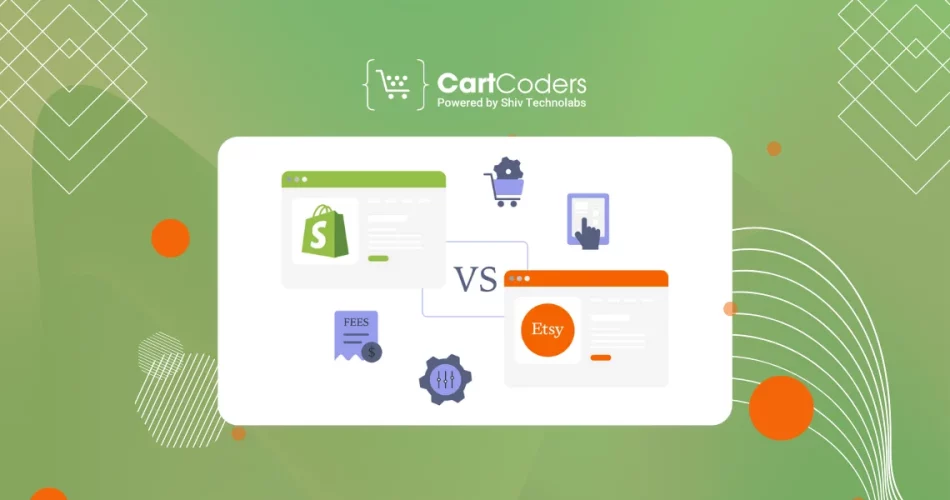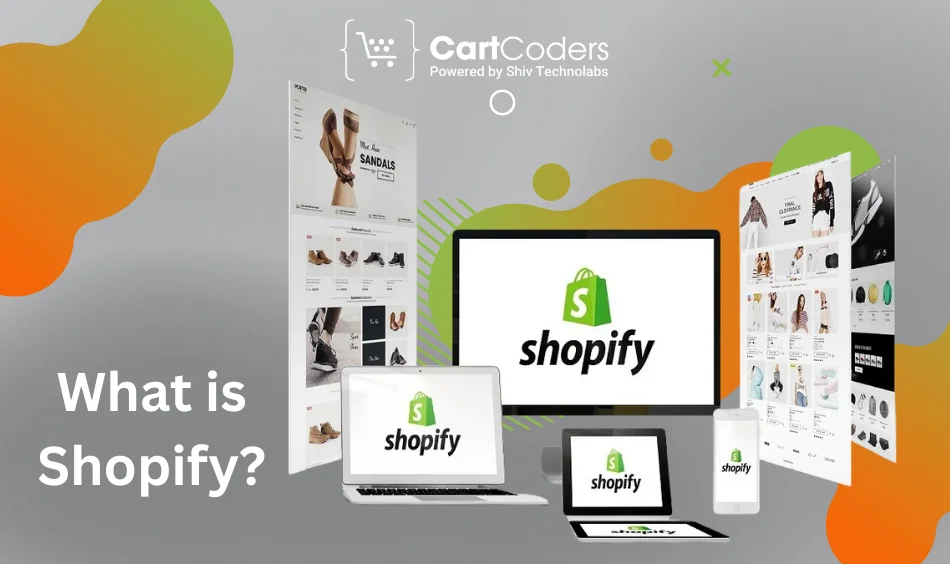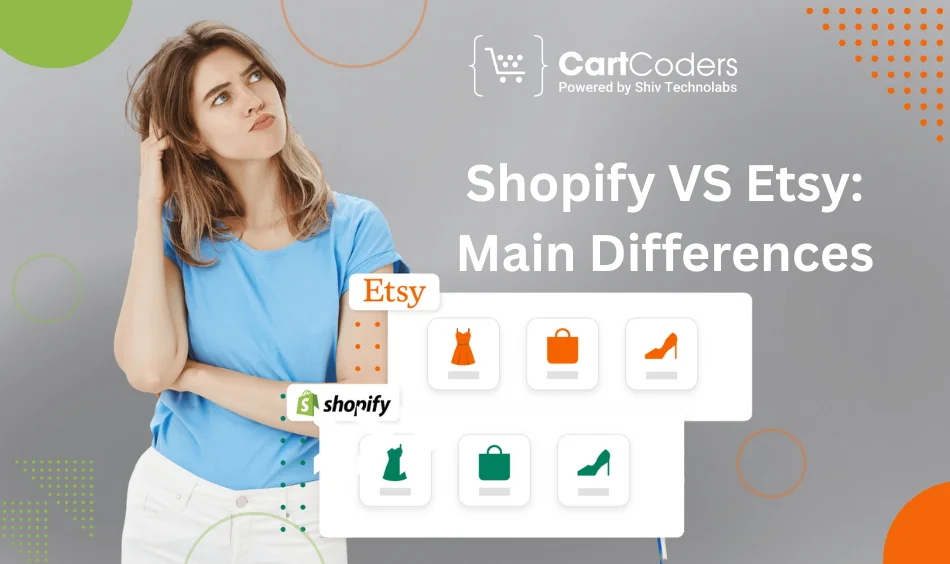Custom Engagement Solutions
Unlock tailored solutions with a free, no-obligation strategy session.
Expert Developers & Engineers on Demand
Scale Your Team with Skilled IT Professionals
Expert Guidance for Digital Transformation

Starting an online business feels exciting. But before anything else, you need to pick the right place to sell. The battle between the best begins: Shopify vs Etsy. Both platforms enable creators and brands to sell their products online. But they work in different ways.
This blog will help you understand the significant differences between Shopify vs Etsy. We will understand what each one does, how they work, and which one gives better results. You will also know which platform suits what type of business. If you are a creator, a small brand, or a business owner, this article is for you.

Online store development is made simple through Shopify’s platform. The platform allows you to determine the aesthetic design and product list, as well as the payment collection methods. The entire store belongs to you as its owner. Your website visitors purchase products directly from your store.
Shopify powers about 10% of the entire US eCommerce market. Many top online stores use it because it gives them complete control. You need to pay a monthly fee to use Shopify. You also pay transaction fees if you don’t use Shopify Payments. However, in return, you gain complete control over your brand and store.
Etsy is an online marketplace. The platform functions as a huge virtual marketplace featuring numerous individual vendors. Customers visit Etsy to purchase a variety of goods, including handmade and vintage items, as well as craft supplies. You must create a storefront within Etsy before adding your products for sale.
Also Read:- Build Etsy-Like Marketplace: Cost, Features & Steps
You don’t need to build a website. Not only that, but you only create listings, pay listing fees, and give Etsy a small share of every sale. You don’t have to worry about traffic because Etsy already has 96 million shoppers.

Let’s now examine how Shopify and Etsy differ in simple terms.
Shopify gives full ownership. You control your store, your customer data, and your website. Etsy owns the platform. You have a shop on their website. You follow their rules. You don’t own the traffic or customer data.
Shopify allows complete branding. You can pick your logo, colours, theme, and domain. Your store looks precisely how you want it.
Etsy limits branding. All shops look similar. You can add a logo and a banner, but you cannot make significant changes beyond that.
Shopify lets you customize everything. You can change the design, add features, or install apps. You decide how your store works.
Etsy allows only product listings and shop info. You cannot add custom features or change the layout.
Shopify depends on your marketing. You bring people to your store through ads, SEO, and social media. Etsy brings traffic. Buyers already search on Etsy. You can still get views even without heavy marketing.
Shopify has a fixed monthly fee. You may also pay for apps, themes, and transaction fees.
Etsy charges $0.20 per product listing. It also takes a 6.5% cut on every sale. Payment processing and other costs add to the total.
| Feature | Shopify – Pros | Shopify – Cons |
| Control | You have full control over your store | You have to manage everything yourself |
| Branding | You can build a strong, unique brand | It takes time and design effort |
| Growth | Scales well as your business grows | You need to plan and invest |
| Products | Supports all kinds of products | Needs better setup for digital or custom items |
| Tools | Offers many apps and features | Some apps cost extra |
| Cost | Fixed monthly plans are available | Monthly costs can add up with extras |
| Marketing | You control SEO, ads, and email tools | You must bring your traffic |
| Feature | Etsy – Pros | Etsy – Cons |
| Start-up | Easy to set up and list products | Minimal control over shop layout |
| Cost | No monthly fee, just listing and selling fees | Fees add up per sale and listing |
| Traffic | Etsy brings built-in shoppers | You compete with thousands of sellers |
| Products | Best for handmade, vintage, and art | Not ideal for branded or mass-produced items |
| Effort | You don’t need to handle the tech setup | You follow Etsy’s rules and limits |
| Branding | Basic shop branding allowed | All shops look similar |
| Data | Simple sales reports included | You don’t own customer data or contacts |
If you are serious about growing your brand, Shopify is the better choice. It is great for:
Shopify is also better for long-term growth. If you want to create a strong brand and keep your customer data, go with Shopify.
Etsy works best for small creators who sell handmade or unique items. It is good for:
If you’re starting and want a simple setup, Etsy can be a good option. But over time, many sellers move to Shopify.
Yes, you can use both. Some sellers list a few products on Etsy to get new customers. Then they move those customers to their Shopify store later. It works well if you use Etsy to bring attention and Shopify to build a brand.
But managing both takes time and effort. You will need to manage stock, orders, and marketing on two separate platforms.
Search engine visibility matters. Shopify lets you control your SEO. You can set page titles, meta descriptions, and URLs. You can blog, run ads, and use email marketing tools.
Etsy has limited SEO options. You can add keywords in your product title and tags. However, you can’t control how Etsy displays your page.
On Etsy, your product competes with thousands of others. It can be hard to rank. Shopify gives you a better chance if you know how to use SEO properly.
Shopify supports many payment gateways. It includes credit cards, PayPal, Apple Pay, and more. You can also offer custom shipping rates and discounts.
Etsy has its own payment system. It works fine, but you don’t get much control over how it looks or works.
If you want to offer a smooth and branded checkout experience, Shopify is a better option.
Shopify gives strong data tools. You can see where traffic originates, what people click on, and how they shop.
Etsy gives limited data. You can view orders, but not much detail is available. If you want to improve your marketing and better understand your buyers, Shopify can help you even more.
Shopify gives you full power to build a brand. It costs more, but it grows with your business. You get more tools, more control, and better long-term value.
Etsy is fast and straightforward. It brings traffic without much effort. But it limits your growth. It suits small sellers and hobbyists.
Whether you choose Shopify, Etsy, or both, setting up the proper setup takes time. You need design, setup, and marketing support. That’s where CartCoders helps.
CartCoders builds custom Shopify stores for creators, brands, and businesses. They handle the hard part so you can focus on your products. If you want to shift from Etsy to Shopify or start fresh, CartCoders makes it easy.
Our team of experts helps you in the following ways:
If you are serious about growing your business, get started with CartCoders today. We have the power to transform your store with world-class Shopify development services.
Projects delivered in 15+ industries.
95% retention rate, building lasting partnerships.
Serving clients across 25+ countries.
60+ pros | 10+ years of experience.